

The Asian Financial Crisis of 1997 - 1998. The Asian Financial Crisis of 1997 - 1998 and the Behavior of Asian Stock Markets by Urbi Garay Urbi Garay urbi.garay@iesa.edu.ve is an Assistant Professor of Finance at the Instituto de Estudios Superiores de Administración (IESA) 1.
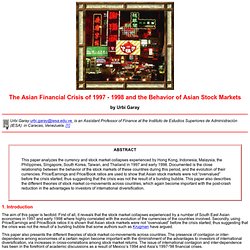
Introduction The aim of this paper is twofold. This paper also presents the different theories of stock market co-movements across countries. In the second section of this paper the behavior of S.E. 2. The Asian financial crisis started with the devaluation of Thailand’s Bath, which took place on July 2, 1997, a 15 to 20 percent devaluation that occurred two months after this currency started to suffer from a massive speculative attack and a little more than a month after the bankruptcy of Thailand’s largest finance company, Finance One.
A second sub-period of the currency crisis can be identified starting in early November, 1997 after the collapse of Hong Kong’s stock market (with a 40 percent loss in October). 3. 4. And then the bubble burst. 5. 6. How the IMF helped create and worsen the Asian financial crisis. How the IMF helped create and worsen the Asian financial crisis The late 1990s Asian meltdown was caused in large part by South Korea, Thailand, the Philippines, Malaysia and Indonesia's heavy reliance on short-term foreign loans and openness to hot money -- a reliance that came from following advice proferred by the U.S.
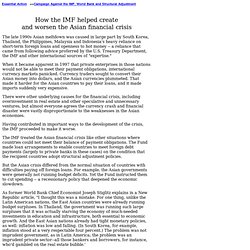
Treasury Department, the IMF and other international sources of "expertise. " When it became apparent in 1997 that private enterprises in those nations would not be able to meet their payment obligations, international currency markets panicked. Currency traders sought to convert their Asian money into dollars, and the Asian currencies plummeted. That made it harder for the Asian countries to pay their loans, and it made imports suddenly very expensive. Revisiting how Malaysia overcame the financial crisis. Global Trends by Martin Khor Sunday 18 January 2004 Tan Sri Nor Mohamed Yakcop’s appointment as Finance Minister II is an occasion to revisit the unorthodox policy measures Malaysia took in the dark days of the financial crisis that was initially condemned by the global financial establishment but subsequently acknowledged as being effective.
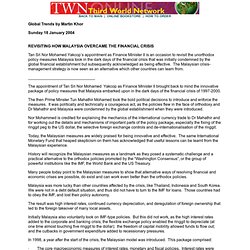
The Malaysian crisis-management strategy is now seen as an alternative which other countries can learn from. The appointment of Tan Sri Nor Mohamed Yakcop as Finance Minister II brought back to mind the innovative package of policy measures that Malaysia embarked upon in the dark days of the financial crisis of 1997-2000. The then Prime Minster Tun Mahathir Mohamed took the bold political decisions to introduce and enforce the measures. Today, the Malaysian measures are widely praised for being innovative and effective. Malaysia was more lucky than other countries affected by the crisis, like Thailand, Indonesia and South Korea. Mahathir Says Limited Asia Threat if Greece Exits Euro. Greece leaving the euro would have limited effect on Asia and the Mediterranean country should study such an exit as a way to restore competitiveness, Malaysia’s leader during the 1998 Asian financial crisis said.
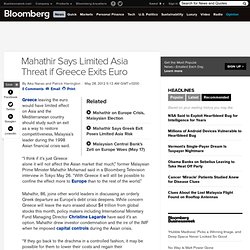
“I think if it’s just Greece alone it will not affect the Asian market that much,” former Malaysian Prime Minister Mahathir Mohamad said in a Bloomberg Television interview in Tokyo May 26. “With Greece it will still be possible to confine the effect more to Europe than to the rest of the world.” Mahathir, 86, joins other world leaders in discussing an orderly Greek departure as Europe’s debt crisis deepens. While concern Greece will leave the euro erased about $4 trillion from global stocks this month, policy makers including International Monetary Fund Managing Director Christine Lagarde have said it’s an option. Mahathir drew investor condemnation and the ire of the IMF when he imposed capital controls during the Asian crisis.
‘A Step Back’ ‘Weak’ Position Disorderly Default. IMFと戦い国民・国家を守ったマハティールに学ぶべし!②IMF「救済策」が明暗を分けた. <当ブログ「橋下維新は答えではない!」
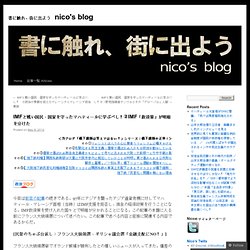
シリーズ:橋下維新の正体↓> その①ファシストは人々の心に巣食うファシズムに囁きかける その②形骸化する民主主義:選挙で選ばれぬ人たちが政治を動かしている その③選挙で選ばれぬ新自由主義者たちによって売りに出される大阪:大前研一と竹中平蔵の影 その④【地下鉄利権】関西私鉄幹部が大量に大阪市参与に就任していたことが判明。 裏で進められる公共財の解体と簒奪。 /一刻も早く橋下リコール運動を開始すべし。 その⑤【大阪地下鉄民営化利権続報】在阪マスコミは関西私鉄の事実上支配下にある! マスコミが橋下維新・地下鉄「民営化」問題を報じない理由 今回は前回の記事の続きである。 [民衆のちゃぶ台返し:フランス大統領選・ギリシャ議会選「金融支配にNO!」] フランス大統領選挙でオランド候補が勝利したとの嬉しいニュースが入ってきた。 田中康夫・衆議院議員のツイッターより引用する。 —————————- フランソワ・オランド候補 「私の真の敵対者。 www.ndl.go.jp/jp/data/publication/legis/239/023910.pdf. www18.ocn.ne.jp/~yokamoto/Message_To_Japan.pdf. アジア通貨危機報道・15年目の真実─読売新聞・林田裕章記者の報道を振り返る. いまから15年前の1997年、タイのバーツ下落に端を発したアジア通貨危機によって、マレーシア経済も苦境に陥った。
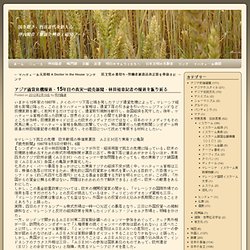
このときマハティール首相は、通貨下落の引き金を引いたヘッジファンドなど投機家筋を厳しく批判するだけではなく、通貨取引規制を断行し、自国経済を死守した。 後年、マハティール首相の採った政策は、世界のエコノミストの間でも評価された。 ところが当時、投機家筋サイドに立った欧米のメディアだけではなく、日本のマスメディアもその尻馬に乗って、マハティール首相を執拗に攻撃していた。 特に顕著だった読売新聞シンガポール特派員の林田裕章記者の報道を振り返り、その意図について改めて考察する材料としたい。 ①マレーシア孤立の危機 欧米敵視の株価策裏目 ASEM巡り東南アに亀裂 『読売新聞』1997年9月5日付朝刊、6面 【シンガポール4日=林田裕章】マレーシアが外交・経済両面で孤立の危機に陥っている。 ②マレーシア・ドル最安値 マハティール首相の“舌禍”に疑問と批判の声 『読売新聞』1997年9月24日付朝刊、8面 【シンガポール23日=林田裕章】「為替投機は禁止すべきだ」とのマハティール・マレーシア首相の発言(二十日)が二十二日、マレーシア・ドルの最安値を誘ったことで、首相の真意をいぶかる声が高まっている。 ③マレーシア首相のソロス氏非難 自慢の経済揺れ、指導者に焦り(解説) 『読売新聞』1997年10月1日付朝刊、29面 マレーシアのマハティール首相の言動で、同国経済が動揺している。 ④マハティール首相、米に屈するな!! ⑤「首相は退陣を」 米投資家、ソロス氏の発言に政界カンカン/マレーシア 『読売新聞』1998年12月7日付朝刊、9面 ◆「扇動」「ごう慢」…“護国”意識噴出 【シンガポール6日=林田裕章】マレーシアのマハティール首相に「市場混乱の元凶」と繰り返し非難された米国の著名な投資家ジョージ・ソロス氏が、露骨に同首相の退陣を促し、マレーシア政界各層の猛反発を呼んでいる。